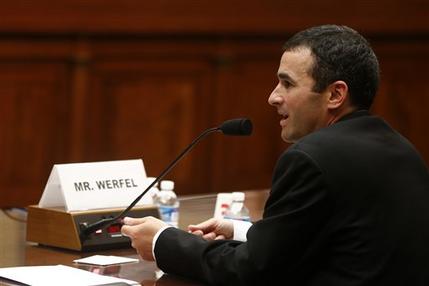WASHINGTON (AP) — Congressional investigators are starting to see cracks in the Internal Revenue Service argument that a small group of agents in the Cincinnati office solely targeted conservative political groups.

Investigators, who are still in the early stages of their probe, have not uncovered any direct evidence that senior officials in Washington ordered the agents to target tea party groups, or why they may have done so.
But two agents in the IRS’s Cincinnati office say they believe their work was being closely monitored by higher-ups in Washington. One agent, Elizabeth Hofacre, complained to investigators that she was being micromanaged by Washington when she processed applications for tax-exempt status by tea party groups, according to a transcript of her interview with investigators.
Her interview suggests a long trail of emails that could support her claim.
“It was demeaning,” Hofacre said. “One of the criteria is to work independently and do research and make decisions based on your experience and education, whereas on this case, I had no autonomy at all through the process.”
The revelation could prove to be significant if investigators are able to show that Washington officials were involved in singling out tea party and other conservative groups for extra scrutiny when they applied for tax-exempt status. IRS officials have said repeatedly that the targeting was initiated by front-line agents in the Cincinnati office and was stopped once senior officials in Washington found out.
A yearlong audit by the agency’s inspector general found no evidence that Washington officials ordered or authorized the targeting. However, the inspector general blamed ineffective management by senior IRS officials for allowing the targeting to continue for nearly two years during the 2010 and 2012 elections.
Since the revelations were made public last month, much of the agency’s top leadership has been replaced. President Barack Obama forced acting IRS Commissioner Steven Miller to resign, replacing him with Danny Werfel, a former White House budget official who is conducting a review of the agency’s operations.
Three congressional committees and the Justice Department are also investigating. Investigators for the House Oversight and Government Reform Committee and the House Ways and Means Committee have interviewed at least four IRS workers as part of their probe.
The Associated Press viewed transcripts of interviews with two IRS agents working in the Cincinnati office.
Gary Muthert, an IRS agent there, said his local supervisor told him in March 2010 to check the applications for tax-exempt status to see how many were from groups with “tea party” in their names. The supervisor’s name was blacked out in the transcript.
“He told me that Washington, D.C., wanted some cases,” Muthert said of his supervisor.
Muthert said he came up with fewer than 10 applications. But after checking some of the group’s websites, he noticed similar groups with “patriots” or “9-12 project” in their names, so he started looking for applications that mentioned those terms too.
Over a two-month period, Muthert said he found about 40 applications that mentioned tea party, patriots or 9-12 project – the latter being groups that aspire to re-instill a post-9/11 spirit of unity in the country.
“I used `patriots’ because some of the tea parties wouldn’t, they would shorten their name to TP Patriots,” Muthert said. “I thought, OK, I will use `patriot.'”
Muthert said his supervisor told him that someone in Washington wanted to see seven of the applications, so Muthert prepared the files.
Whom did you send them to? An investigator asked.
“I don’t know,” Muthert answered.
Muthert did not respond to multiple requests by the AP for comment.
The IRS was screening the groups’ applications because agents were trying to determine their level of political activity. IRS regulations say tax-exempt social welfare organizations may engage in some political activity but the activity may not be their primary mission. It is up to the IRS to make that determination.
Then-Commissioner Doug Shulman and Miller, who was a top deputy at the time, told Congress that they didn’t learn about tea party groups being targeted until the spring of 2012. They said they didn’t come forward publicly until this year because the agency’s inspector general was investigating the matter.
The inspector general’s report said Lois Lerner, who headed the IRS division that oversees tax exempt organizations, had been briefed on the targeting in June 2011. She ordered the initial tea party criteria to be scrapped, but it later evolved to include groups that promoted the Constitution and the Bill of Rights, the report said.
Lerner is the IRS official who first publicly disclosed the targeting at a legal conference in Washington on May 10.
“It’s the line people that did it without talking to managers,” Lerner told the AP on the day of the conference. “They’re IRS workers, they’re revenue agents.”
Less than two weeks later, Lerner refused to answer questions at a congressional hearing, citing her constitutional right against self-incrimination. The next day, Werfel placed her on paid administrative leave.
Hofacre, who also works in the Cincinnati office, told investigators she was in charge of processing applications from tea party groups – once they were selected by other agents – from April 2010 to October 2010. Hofacre said her supervisor in Cincinnati, whose name was blacked out in the transcript, told her to handle the applications.
But, she said, an IRS lawyer in Washington, Carter Hull, micromanaged her work and ultimately delayed the processing of applications by tea party groups.
Hull is a lawyer in the division that handles applications for tax-exempt status. But, Hofacre said, his interest in the cases was highly unusual.
“I thought it was over the top,” she told investigators.
Hofacre said Hull signed off on letters she sent to the groups asking them for additional information and then reviewed their responses. Hofacre complained that Hull was slow to sign off on the letters.
“All I remember saying and thinking is, `This is ridiculous.’ Because at the same time, you are getting calls from irate taxpayers. And I see their point,” Hofacre said.
Hofacre said she became so frustrated with the delays that she applied for a different job within the agency and transferred in October 2010.
Neither Hofacre nor Hull responded to requests for comment.





